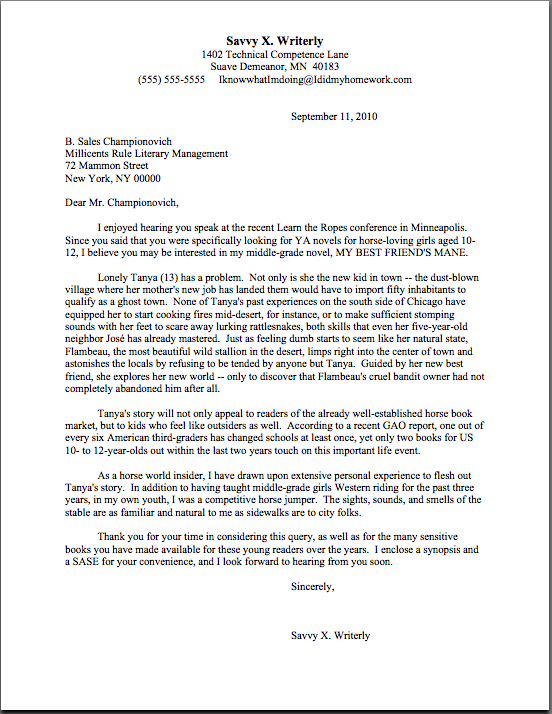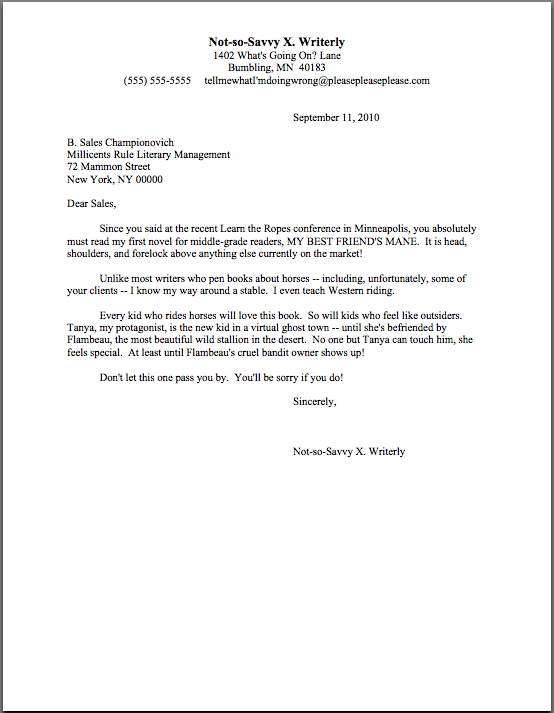
Around this time yesterday (forgive my slightly squirrelly posting order, campers; there’s a lot of territory to cover in Querypalooza), we were talking about how narrative voice does and does not play a role in a strong query letter. Yet even as my much-beleaguered fingertips were typing a spirited defense of a narrative paragraph that tells the book’s story, rather then just discussing it the way one might in an English term paper, I found myself murmuring, “You know, I’ve been talking about each of the requisite elements of a query — as well as a couple that are merely helpful and stylish to include — as if they were building blocks: stack ‘em up, and you have yourself a query. I’m pretty sure that we’ve covered the constituent parts sufficiently, but have I given enough examples of how those parts fit together into a harmonious whole?”
And my significant other, who happened to be sitting on the far side of the room, looked up from his book and said, “What are you muttering about now?”
Well might he ask. Although the overall impression a careful reader might derive from Querypalooza is a coherent whole, we’ve mostly been talking about individual parts, paragraphs, or even sentences. It’s been sort of like asking you to form a mental picture of the beach above by showing it to you like this:



It’s not that any of these close-ups are inaccurate (although that last shot of the boulder has some perspective problems), but even viewed all together, they don’t give the full picture. This evening, I would like to rectify that by simply overwhelming you with examples of entire query letters.
Yes, in response to what half of you just shouted: I, a writer, am voluntarily going to sit down and write not only one query letter tonight, but several. And I’m not only not going to be driven insane by stress in the process — I’ll probably even enjoy it.
How is this miracle possible? Come closer, and I’ll let you in on a little professional writers’ secret: querying gets easier with practice. Once you get the hang of the logic behind it and learn to describe a book in professional terms, it actually isn’t all that hard.
That’s why, in case you’d been wondering, agents, editors, and even already-agented writers tend to give querying advice as if a show-stopping query were something any writer could toss off in 15 minutes flat. They’re not being insensitive to the difficulties facing the aspiring writer intimidated by the querying process; they’ve just forgotten what it’s like to do it for the first time. Or the incredible courage required for someone who knows nothing about such a letter other than the fact that he cannot land an agent without it to take pen in hand and even begin a draft, much less send it.
I’m here to tell you: it gets easier with practice. At least it does if you understand what’s supposed to go into the darned thing.
To quadruple-check that all of you do in fact understand what’s supposed to go into the darned thing, let’s recap what’s required, and what merely advisable to mention:
1. The book’s title
2. The book’s category, expressed in existing category terms
3. A brief statement about why you are approaching this particular agent
4. A descriptive paragraph or two, giving a compelling foretaste of the premise, plot, and/or argument of the book, ideally in a voice similar to the narrative.
5. An EXTREMELY brief closing paragraph thanking the agent for considering the project.
6. A SASE, if querying by mail.
These are, as we discussed yesterday, the absolutely indispensable elements of a successful query letter. Without each and every one, rejection is more or less inevitable.
Stop kicking yourselves and wailing, those of you who realized that you have in the past sent out letters with one or more of these rudiments. Practically everyone does that at first; see comment above re: it getting easier with practice. Those dark days are behind you now.
What makes me so sure of that, you ask? Because you’re never going to forget to include each and every one of these essential bits of information in a query letter again, right?
Heck, you’re even going to get fancy and include some not strictly required elements that Millicent the agency screener always enjoys seeing in a query:
7. A brief marketing paragraph explaining for whom you have written this book and why this book might appeal to that demographic in a way that no other book currently on the market does.
8. A platform paragraph giving your writing credentials and/or expertise that renders you the ideal person to have written this book.
You also know — and this is going to place you miles ahead of a startlingly broad swathe of the aspiring writer population — what all of these building blocks are supposed to look like once they’re assembled into a building. A little something like this, to be precise (and my apologies in advance if the images here come out a trifle fuzzy; if they do, try enlarging them by holding down the COMMAND key and pressing + several times):

See? A place for everything, and everything in its place.
But what happens if the various elements don’t appear more or less in the expected order, or if the tone is not professionally respectful? Great question. Let’s take a peek at the same book with the same selling points, not presented nearly so well.

I like to call this the Good Query Gone Bad: it contains all the basic elements (although not done very well); the querier has clearly given some thought to the market appeal of his book (but not presented the results very convincingly); the story itself sounds rather interesting (despite being poorly described).
So if you were Millicent the agency screener, would you ask to see the manuscript? Or would you be too put off by the tone?
I sense some furrowed brows out there. “But Anne,” brow-knitters across the land protest, “this second version looks okay to me. Not nearly as good as the first one, of course, but still, it does everything I’ve always heard a query needs to do. The tone may not be professional, but it’s hardly insulting, and you said yourself that the plot still sounds interesting. So mightn’t it get past a Millicent who happens to be in a good mood?”
Well, I suppose it might, oh furrowers — but do you have any idea how mood-deflating reading a hundred queries before lunch can be? And this is one of the better ones. Also one of the more polite, believe it or not.
Now do you want to risk taking your chances on Millie’s mood saving this one, Savvy?
You’re quite right that the tone problems here are subtle, so much so that someone who has never seen a professionally-phrased query letter before might not catch the difference. So we’re going to put some of those skills we all learned in our English classes to good use and do a solid, old-fashioned compare-and-contrast exercise.
Let’s go through our list of required elements one by one, to see what a difference attitude and thoroughness make:
The book’s title: both include that in the first paragraph, check.
The book category: again, check. But take a peek at how differently this information is conveyed.
Good example: Since you said that you were specifically looking for YA novels for horse-loving girls aged 10-12, I believe you may be interested in my middle-grade novel.
Gone Bad example: Since you said…you absolutely must read my first novel for middle-grade readers
Not nearly so specific, is it? And call me old fashioned, but I don’t approve of people asking favors giving orders: while I believe you may be interested in is polite speculation, you absolutely must read implies that the agent has no choice in the matter.
From orders, Not-so-Savvy escalates by the end of the letter to threats:
Gone Bad example: Don’t let this one pass you by. You’ll be sorry if you do!
Excuse me? I’m quite positive that Not-so-Savvy’s mother, dear old white-haired Mrs. Writerly, cannot know that her offspring is communicating this way with strangers — and strangers he wants to help him, no less. It would break her tender heart.
So let’s not tell her, okay? Or about that nasty little dig at the writers Mr. Championovich has represented in the past.
And what do you suppose is the point of Not-so-Savvy’s going out of his way to mention that this is my first novel for middle-grade readers? How could that possibly be relevant to Millicent’s decision whether she believes this book might interest Mr. Championovich? Unless the query went on to mention previous publications in other book categories, whether this was Not-so-Savvy’s first attempt to write a YA book or his 47th wouldn’t really weigh into her decision.
Can’t you think of better ways for a querier to use that precious page space?
A brief statement about why you are approaching this particular agent: again, check on both counts. But again, note the differential in tone:
Good example: I enjoyed hearing you speak at the recent Learn the Ropes conference in Minneapolis. Since you said that you were specifically looking for YA novels for horse-loving girls…the many sensitive books you have made available for these young readers over the years.
Ah, you hadn’t thought of that bit in the last paragraph as being part of the why me? explanation, had you? To Millicent’s eye, it is: it implied that the Savvy has gone to the trouble of finding out what her boss has represented in the past.
Gone Bad example: Since you said at the recent Learn the Ropes conference in Minneapolis…
Um, since he said what?
Actually, this was an honest-to-goodness typo in my hastily-constructed example, but as it’s an extremely common species of typo, I didn’t correct it. Did you catch it the first time? Millicent would have.
Had I reminded you lately to proofread every query every time?
A descriptive paragraph: as a professional reader, I think there’s no comparison between the two on this point: the first tells the story via vivid details by focusing on characterization; the second just summarizes the plot.
Admittedly, though, it still makes the story sound exciting. Most queriers would actually be quite pleased if they could be simultaneously this pithy and this entertaining in their descriptive paragraphs.
The glitch in the second is really where this information falls in the letter. See if you can spot the problem in the third paragraph:
Gone Bad example: Every kid who rides horses will love this book. So will kids who feel like outsiders. Tanya, my protagonist, is the new kid in a virtual ghost town — until she’s befriended by Flambeau, the most beautiful wild stallion in the desert. No one but Tanya can touch him, she feels special. At least until Flambeau’s cruel bandit owner shows up!
Comes rather late in the paragraph, doesn’t it? Especially for a piece of writing intended for eyes notorious for skimming queries very quickly.
In journalism, this is called burying the lead. It’s a good story — why hide its merits in the middle of a paragraph about something else entirely?
A brief marketing paragraph explaining for whom you have written this book and why this book might appeal to that demographic : this is perhaps where the strongest contrast between the two lies. Gone Bad’s rendition is far and away the most common in actual queries.
Good example: Tanya’s story will not only appeal to readers of the already well-established horse book market, but to kids who feel like outsiders as well. According to a recent GAO report, one out of every six American third-graders has changed schools at least once, yet only two books for US 10- to 12-year-olds out within the last two years touch on this important life event.
“Swoon!” Millicent murmurs. “A writer who knows how to do research! And I’d had no idea how often elementary schoolers move. That’s definitely a large niche market.”
I’d had no idea, either, Millicent, until I conducted a 2-minute web search while I was writing Savvy’s query. Startling, isn’t it? (The fact that they move so much, I mean, not that I was able to turn up a statistic that apt that fast. I do have a Ph.D., you know; I’m trained for this stuff.)
Gone Bad example: It is head, shoulders, and forelock above anything else currently on the market! … Unlike most writers who pen books about horses — including, unfortunately, some of your clients — I know my way around a stable… Every kid who rides horses will love this book. So will kids who feel like outsiders.
Okay, so the joke in the first sentence is actually rather funny (if I do say so myself), but what a lot of unsubstantiated claims! Even if they are true — and it’s starting to be hard to remember that these two queries were for the same book, isn’t it? — why should Millicent believe them?
A platform paragraph: admittedly, both queries do make the writer sound quite knowledgeable about horses. However, Not-so-Savvy has forgotten his single best credential for writing on this particular subject for this particular audience. See if you can spot his unfortunate omission.
Good example: As a horse world insider, I have drawn upon extensive personal experience to flesh out Tanya’s story. In addition to having taught middle-grade girls Western riding for the past three years, in my own youth, I was a competitive horse jumper. The sights, sounds, and smells of the stable are as familiar and natural to me as sidewalks are to city folks..
Gone Bad example: Unlike most writers who pen books about horses — including, unfortunately, some of your clients — I know my way around a stable. I even teach Western riding.
Did you catch it this time? Even setting aside the rather nasty tone of the opening sentence, can you justify his having left out the information that he has been teaching readers in his target demographic to ride their beloved horses for three years?
Oh, Not-So. I’m genuinely worried about your self-esteem.
A closing paragraph thanking the agent for considering the project: hoo boy. Try not to avert your eyes from the disastrous contrast you are about to see.
Good example: Thank you for your time in considering this query, as well as for the many sensitive books you have made available for these young readers over the years. I enclose a synopsis and a SASE for your convenience, and I look forward to hearing from you soon.
Gone Bad example: Don’t let this one pass you by. You’ll be sorry if you do!
Even I feel like averting my eyes from that last one — which is a quote fed to me by an agent who prefers to remain nameless, by the way; she wanted to get the word out that she would prefer, on the whole, never to see this arrangement of words on a query page again.
If it’s all the same to all of you. Which I’m betting it will be, now that you have seen first-hand just how rude ostensibly upbeat hard-sell sayings look in a query.
What a difference knowing how a professional screener might view things, eh? Starting to feel more comfortable navigating those ropes by yourself without a net?
I had planned to stuff a few more positive examples into this post, but frankly, proving so thoroughly that the same book can be queried so differently using precisely the same selling points has depressed me into a stupor. I’m sure I’ll rouse myself for another example-heavy post later this weekend.
But before I sign off, one more thing: you know how I mentioned at the top of this post that agents, editors, and already-agented writers often take it for granted that an aspiring writer really serious about getting into the biz would have done sufficient homework to toss off a query as solid as Savvy’s in 15 minutes flat?
It took me 5 to write both of today’s examples in their entirety. Yes, counting those two minutes of web research.
That’s the result of practice, my friends. That, and knowing precisely what Millicent wants to see in a query. Once a writer understands that the only trick here is figuring out how to present her book in those terms, the actual writing of the darned thing can be downright speedy.
Trust me on this one; I’m a doctor. Book doctor, that is.
Tune in tomorrow at 10 am PST (or thereabouts) for some insights into how to handle a request for a partial manuscript. Good night, sleep tight, don’t let the bad examples bite — and, as always, keep up the good work!